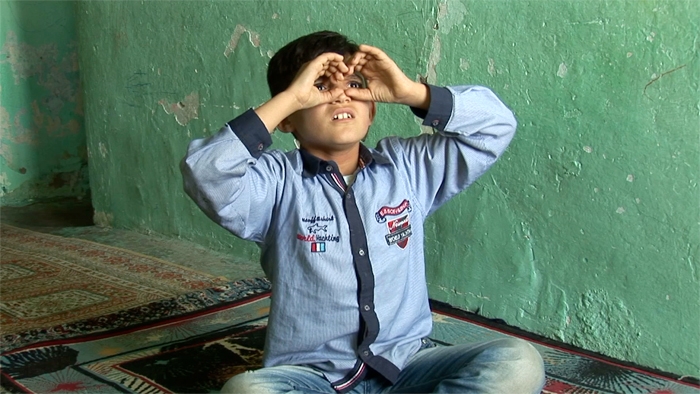In 2009, during a residency in Barcelona, Erkan Özgen met Antoni Tàpies. As they declared their admiration for each other’s work, Tàpies suggested they should, one day, exhibit together. And though it would not happen during the older man’s lifetime (he died in 2012), it seems fitting that when the Kurdish artist’s works eventually found their way to the Tàpies foundation, the exhibition should coincide with a rehanging of the Catalan artist’s most political output, made under Franco’s dictatorship.
While the two bodies of work couldn’t be more distinct formally – Tàpies’s raw, abstract ‘matter paintings’ and assemblages against Özgen’s short, incisive documentarylike videos – they share the urge to give shape and voice to the violence its makers witnessed. The focal point of Giving Voices, Özgen’s first solo show in Spain, is Purple Muslin (2018), a 16-minute documentation of a refugee camp for Yazidis, a religious-minority population forced to flee northern Iraq to escape persecution by ISIS.
The act of giving voice is nowhere as resonant as in these interviews with Yazidi women, so eager are they to vocalise their situation – the atrocities of their persecution, but mostly the sense of displacement and purposelessness they feel, often resulting in depression. Here, talking is a way to stay sane, or at least alive. Özgen’s use of video becomes a mode of empowerment for his subjects and a lens for the artist to reflect on the psychological impact of conflict. In the next room a four-minute video, Wonderland (2016), includes another poignant interview. A deaf child, sitting on the floor of an apartment in his pyjamas, mimes the atrocities he saw before escaping Syria – an emotive and potent account that hints at the limits of spoken language and the potential of other forms of communication to express the traumas experienced by survivors.
Projected on the other side of the room, as an almost perverse counterpart, a new work, Aesthetics of Weapons (2018), portrays an anonymous Turkish policeman and his disturbing relationship with his firearm. While the man’s face remains mostly out of frame, the camera offers closeups of his hands as he manipulates his gun, at times caressing and kissing it; he goes on to describe his affection for it, personifying and eroticising it.
When Özgen turns the camera on state-sanctioned violence, he gives space and visibility to another perspective, which, though it appears initially psychopathic, turns out to be more equivocal: for in sharing such feelings (it’s surprising to see how eager he is to communicate this unsettling intimacy), the policeman displays a form of vulnerability. And it’s this tentative approach to the complex psychological roots and legacies of violence, leaving viewers uncertain about where to position themselves, that makes Özgen’s work so cutting.
Erkan Özgen: Giving Voices, Fundació Antoni Tàpies, Barcelona, 13 November – 24 February 2019
From the January & February 2019 issue of ArtReview
